This article was co-authored by Robert Dhir, MD. Dr. Robert Dhir is a board certified Urologist, Urological Surgeon, and the Founder of HTX Urology in Houston, Texas. With over 10 years of experience, Dr. Dhir’s expertise includes minimally-invasive treatments for enlarged prostate (UroLift), kidney stone disease, surgical management of urological cancers, and men’s health (erectile dysfunction, low testosterone, and infertility). His practice has been named a Center of Excellence for the UroLift procedure, and is a pioneer in non-surgical procedures for ED using his patented Wave Therapy. He earned his undergraduate and medical degrees from Georgetown University and was awarded honors in pre-medical studies, urology, orthopedics, and ophthalmology. Dr. Dhir served as chief resident during his urological surgical residency at University of Texas at Houston / MD Anderson Cancer Center in addition to completing his internship in general surgery. Dr. Dhir was voted Top Doctor in Urology for 2018 to 2019, one of the top three Best Rated Urologists in 2019 & 2020 for Houston Texas, and Texas Monthly has named him to the 2019 & 2020 Texas Super Doctors Rising Stars list.
wikiHow marks an article as reader-approved once it receives enough positive feedback. In this case, 87% of readers who voted found the article helpful, earning it our reader-approved status.
This article has been viewed 267,877 times.
Protein in the urine is never a normal thing (when the levels are above 150 mg per day, which is when your doctor will tell you that you have abnormal levels of protein in your urine). There are times when you have elevated protein only transiently, and it may resolve on its own; however, if the problem is ongoing or particularly severe, you will need to seek medical help. Protein in the urine is often a sign of underlying kidney disease, or of other medical problems if it continues for more than a few days.[1] [2]
Steps
Trying Lifestyle and Medical Treatments
-
1Take steps to reduce your blood pressure.[3] Lifestyle strategies to reduce your blood pressure include:
- Decreasing the salt in your diet. To do so, avoid excess table salt on foods prepared at home. Perhaps more importantly, avoid eating out too frequently, or consuming too many processed foods, as these are known to be high in salt (significantly more so, on average, than foods prepared at home).
- Cutting back on cholesterol. Cholesterol build-up contributes to plaques forming in your arteries, which in turn leads to increased blood pressure. Ask your doctor for blood tests to measure your fat and cholesterol levels to see if this is an area of your diet that could use improvement.
Note: Elevated blood pressure puts a lot of strain on the kidneys, and since persistent proteinuria (elevated protein in the urine) is almost always linked to a problem in the kidneys, reducing your blood pressure can help the problem significantly.
-
2Opt for a blood pressure medication.[4] Essentially everyone who is diagnosed with a level of kidney disease or kidney disfunction (which are the primary reasons for persistently elevated protein in the urine) receives a blood pressure medication from their doctor. Specifically, the ideal one for doctors to prescribe is an "ACE inhibitor" (an angiotensin-converting enzyme inhibitor). Examples include Ramipril, Captopril, and Lisinopril. The benefit of this specific class of blood pressure medication is that it has an additional benefit (and a "protective effect") for your kidneys.
- Ask your doctor about receiving a prescription for this medication, if you are not taking it already.
- You may need more than one blood pressure medication in more severe cases of kidney disease.
Advertisement -
3Ask your doctor about other medical treatments.[5] For instance, if you have an underlying autoimmune disease causing kidney problems (and hence protein in your urine), you may need medications to suppress your immune system. If your kidney troubles (and proteinuria) are complications of diabetes, you may need medications such as Metformin or Insulin to obtain better daily control of your blood sugar levels. There are many potential diagnoses that could lead to kidney trouble and resulting proteinuria, so speak with your doctor to come up with the best medical management for your specific case.
Evaluating The Cause
-
1Diagnose the cause. It is important to understand that they only way to reduce (or treat) protein in your urine is by diagnosing the underlying cause.[6] [7] This is because protein in the urine is not a diagnosis in itself; rather, it is a symptom indicating that something else is going on. It is only in the diagnosing and treating of that "something else" that the elevated protein level itself can be best addressed and dealt with.
-
2Determine which type of "proteinuria" (elevated protein in the urine) you are experiencing.[8] There are three types of proteinuria, and the good news is that two out of the three require no treatment and usually resolve all on their own, with time. The third type, however, requires a more comprehensive medical examination to determine the underlying cause. The three types are:
- Transient proteinuria. This is when a urine test reveals elevated protein on one reading, but the level diminishes on its own and ultimately returns to normal with subsequent readings.[9] Transient proteinuria is normally related to acute stresses such as an illness causing a fever, or more exercise than usual (such as training for a marathon). Once the stress passes, or your body adapts to it, your protein levels should also return to normal.
- Orthostatic proteinuria. This is when the abnormal protein levels are related to postural changes (standing versus sitting versus lying down).[10] It is uncommon, and more likely to be present in adolescents; if present, it does not require treatment, and it almost always resolves itself by adulthood.
- Persistent proteinuria. This is when the protein levels in your urine remain elevated with repeat testing.[11] It is indicative of an underlying problem such as kidney disease, diabetes, autoimmune disease, or another medical condition. It will require a series of tests for diagnostic purposes, as well as medical treatment.
-
3Evaluate any transient stresses you may be experiencing.[12] As previously mentioned, if you are currently ill with a fever, exercising more than usual, or suffering from other acute stressors in your life, the protein levels in your urine may be elevated transiently as a result of this stress. The key here is to see your doctor again a few days later for a repeat urine test (and a repeat measurement), at which point he or she can confirm that your protein levels have diminished and/or hopefully returned to normal. If you are experiencing "transient proteinuria," the great news is that there is nothing you need to do to treat it, and your levels will return to normal on their own within a few days to a couple of weeks.
- Note that if you are experiencing an "acute stressor" (such as fever, exercise, or something else), you should still see your doctor for repeat urine tests to confirm that nothing more serious is going on.[13]
-
4Request repeat urine tests.[14] It is key to obtain repeat urine tests. This is because it is important to obtain a series of measurements of the protein in your urine, to see how it is progressing and whether or not it is improving on its own. Your doctor may offer you a urine test to do in the washroom in his or her clinic, or he or she may ask you to take it home and to return it to the lab once you have collected the urine sample. Note that if you store your urine at home, it needs to be kept cool in the refrigerator until you are able to deliver it to the lab for formal analysis.
-
5Get blood tests.[15] Additional diagnostic testing that your doctor may perform includes blood tests, particularly if he or she suspects that you may have underlying kidney disease or other health problems. If your doctor orders blood tests, he or she will likely be measuring the BUN (blood urea nitrogen) and the Creatinine.[16] Both of these are kidney function tests, providing your doctor with valuable information about the health of your kidneys.
- Your doctor may also order other blood tests such as HbA1c (a diabetes test), or autoimmune antibodies if he or she suspects an underlying autoimmune disease.
- It will all depend on your medical history and the medical conditions that your doctor thinks you are most at risk of having.
-
6Get a kidney biopsy. In some cases, a kidney biopsy is also required as a further investigation to determine the cause of the protein in your urine.[17] This is rarer; however, it may be needed if your doctor cannot otherwise determine the cause.
-
7Be aware that protein in the urine during pregnancy is another matter. If you are currently pregnant and have elevated protein levels, it may be due to a condition called preeclampsia. Check out How to Deal With Preeclampsia for more information on preeclampsia and elevated protein levels in your urine during pregnancy.
Expert Q&A
Did you know you can get expert answers for this article?
Unlock expert answers by supporting wikiHow
-
QuestionHow do they diagnose elevated protein in urine?
 Robert Dhir, MDDr. Robert Dhir is a board certified Urologist, Urological Surgeon, and the Founder of HTX Urology in Houston, Texas. With over 10 years of experience, Dr. Dhir’s expertise includes minimally-invasive treatments for enlarged prostate (UroLift), kidney stone disease, surgical management of urological cancers, and men’s health (erectile dysfunction, low testosterone, and infertility). His practice has been named a Center of Excellence for the UroLift procedure, and is a pioneer in non-surgical procedures for ED using his patented Wave Therapy. He earned his undergraduate and medical degrees from Georgetown University and was awarded honors in pre-medical studies, urology, orthopedics, and ophthalmology. Dr. Dhir served as chief resident during his urological surgical residency at University of Texas at Houston / MD Anderson Cancer Center in addition to completing his internship in general surgery. Dr. Dhir was voted Top Doctor in Urology for 2018 to 2019, one of the top three Best Rated Urologists in 2019 & 2020 for Houston Texas, and Texas Monthly has named him to the 2019 & 2020 Texas Super Doctors Rising Stars list.
Robert Dhir, MDDr. Robert Dhir is a board certified Urologist, Urological Surgeon, and the Founder of HTX Urology in Houston, Texas. With over 10 years of experience, Dr. Dhir’s expertise includes minimally-invasive treatments for enlarged prostate (UroLift), kidney stone disease, surgical management of urological cancers, and men’s health (erectile dysfunction, low testosterone, and infertility). His practice has been named a Center of Excellence for the UroLift procedure, and is a pioneer in non-surgical procedures for ED using his patented Wave Therapy. He earned his undergraduate and medical degrees from Georgetown University and was awarded honors in pre-medical studies, urology, orthopedics, and ophthalmology. Dr. Dhir served as chief resident during his urological surgical residency at University of Texas at Houston / MD Anderson Cancer Center in addition to completing his internship in general surgery. Dr. Dhir was voted Top Doctor in Urology for 2018 to 2019, one of the top three Best Rated Urologists in 2019 & 2020 for Houston Texas, and Texas Monthly has named him to the 2019 & 2020 Texas Super Doctors Rising Stars list.
Board Certified Urologist & Urological Surgeon
-
QuestionWhat food and precautions should be taken for the above?
 Chris M. Matsko, MDDr. Chris M. Matsko is a retired physician based in Pittsburgh, Pennsylvania. With over 25 years of medical research experience, Dr. Matsko was awarded the Pittsburgh Cornell University Leadership Award for Excellence. He holds a BS in Nutritional Science from Cornell University and an MD from the Temple University School of Medicine in 2007. Dr. Matsko earned a Research Writing Certification from the American Medical Writers Association (AMWA) in 2016 and a Medical Writing & Editing Certification from the University of Chicago in 2017.
Chris M. Matsko, MDDr. Chris M. Matsko is a retired physician based in Pittsburgh, Pennsylvania. With over 25 years of medical research experience, Dr. Matsko was awarded the Pittsburgh Cornell University Leadership Award for Excellence. He holds a BS in Nutritional Science from Cornell University and an MD from the Temple University School of Medicine in 2007. Dr. Matsko earned a Research Writing Certification from the American Medical Writers Association (AMWA) in 2016 and a Medical Writing & Editing Certification from the University of Chicago in 2017.
Family Medicine Physician
-
QuestionWhich medicine is best for protein leakage?
 Chris M. Matsko, MDDr. Chris M. Matsko is a retired physician based in Pittsburgh, Pennsylvania. With over 25 years of medical research experience, Dr. Matsko was awarded the Pittsburgh Cornell University Leadership Award for Excellence. He holds a BS in Nutritional Science from Cornell University and an MD from the Temple University School of Medicine in 2007. Dr. Matsko earned a Research Writing Certification from the American Medical Writers Association (AMWA) in 2016 and a Medical Writing & Editing Certification from the University of Chicago in 2017.
Chris M. Matsko, MDDr. Chris M. Matsko is a retired physician based in Pittsburgh, Pennsylvania. With over 25 years of medical research experience, Dr. Matsko was awarded the Pittsburgh Cornell University Leadership Award for Excellence. He holds a BS in Nutritional Science from Cornell University and an MD from the Temple University School of Medicine in 2007. Dr. Matsko earned a Research Writing Certification from the American Medical Writers Association (AMWA) in 2016 and a Medical Writing & Editing Certification from the University of Chicago in 2017.
Family Medicine Physician
References
- ↑ Robert Dhir, MD. Board Certified Urologist & Urological Surgeon. Expert Interview. 23 September 2020.
- ↑ http://emedicine.medscape.com/article/238158-overview
- ↑ http://www.uptodate.com/contents/protein-in-the-urine-proteinuria-beyond-the-basics
- ↑ http://www.uptodate.com/contents/the-nephrotic-syndrome-beyond-the-basics
- ↑ http://www.uptodate.com/contents/glomerular-disease-overview-beyond-the-basics
- ↑ Robert Dhir, MD. Board Certified Urologist & Urological Surgeon. Expert Interview. 23 September 2020.
- ↑ http://emedicine.medscape.com/article/238158-overview
- ↑ http://www.uptodate.com/contents/protein-in-the-urine-proteinuria-beyond-the-basics
- ↑ http://www.uptodate.com/contents/protein-in-the-urine-proteinuria-beyond-the-basics
- ↑ http://www.uptodate.com/contents/protein-in-the-urine-proteinuria-beyond-the-basics
- ↑ http://www.uptodate.com/contents/protein-in-the-urine-proteinuria-beyond-the-basics
- ↑ http://www.uptodate.com/contents/protein-in-the-urine-proteinuria-beyond-the-basics
- ↑ Robert Dhir, MD. Board Certified Urologist & Urological Surgeon. Expert Interview. 23 September 2020.
- ↑ http://emedicine.medscape.com/article/238158-overview
- ↑ http://emedicine.medscape.com/article/238158-overview
- ↑ http://www.uptodate.com/contents/protein-in-the-urine-proteinuria-beyond-the-basics
- ↑ http://www.uptodate.com/contents/protein-in-the-urine-proteinuria-beyond-the-basics
About This Article
To reduce protein in your urine, you'll need to diagnose the underlying cause by determining which type of proteinuria you are experiencing, since some types, like orthostatic proteinuria, will resolve on their own. For example, if your doctor tests your urine multiple times and finds elevated protein levels on more than one reading, it could be a sign of an underlying condition such as kidney disease, diabetes, or an autoimmune disorder. If you have persistent proteinuria because of a kidney problem, consider making lifestyle changes to reduce your blood pressure by decreasing your salt and cholesterol intake. In some cases, your doctor may also recommend blood pressure medication or other medical treatments, such as medication to suppress your immune system. For more tips from our Medical co-author, including how to deal with transient proteinuria, keep reading.

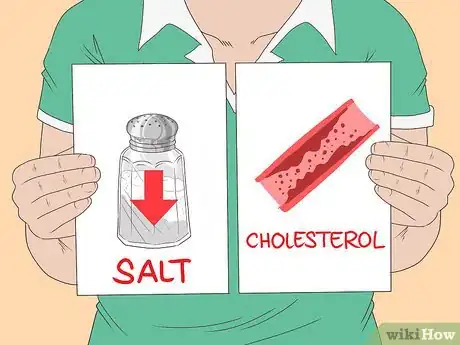
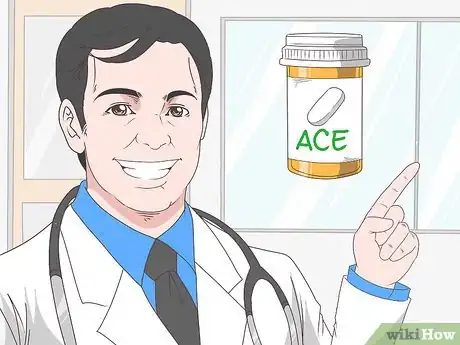
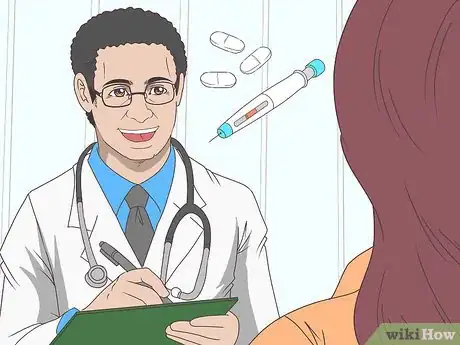
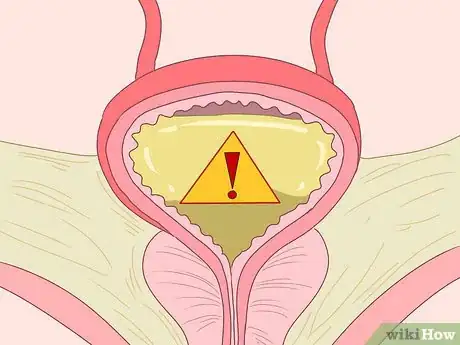


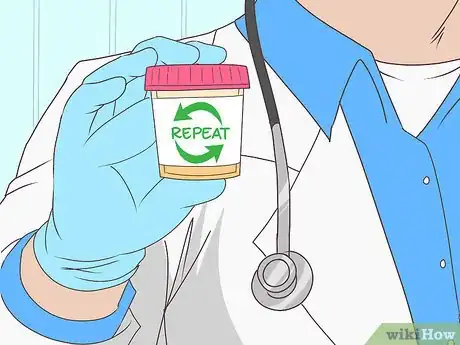
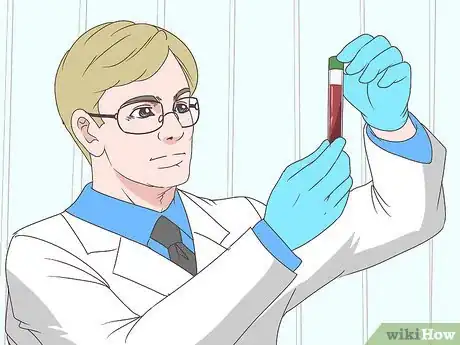
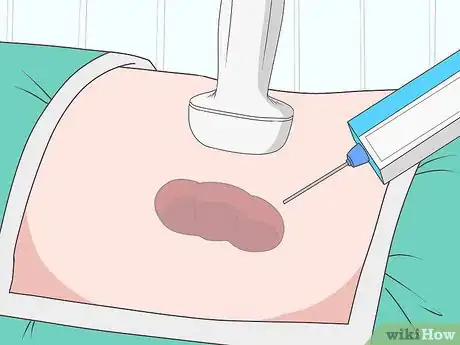

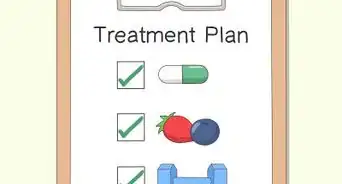





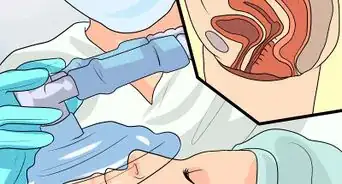
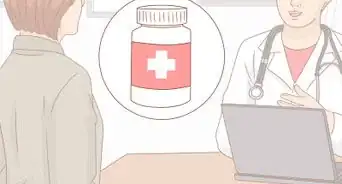





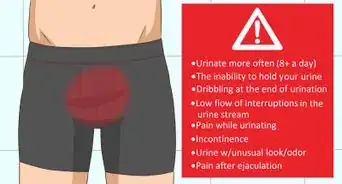









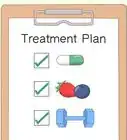







































Medical Disclaimer
The content of this article is not intended to be a substitute for professional medical advice, examination, diagnosis, or treatment. You should always contact your doctor or other qualified healthcare professional before starting, changing, or stopping any kind of health treatment.
Read More...